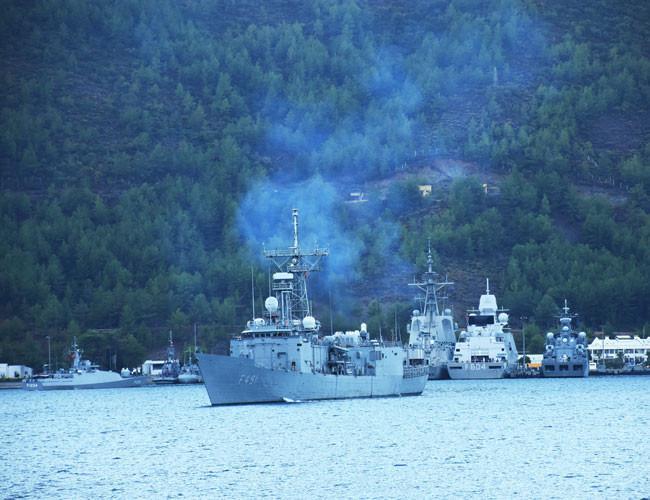
Ties between Turkey and Greece are facing a new source of tension on military terms, this time due to natural reserves in the Mediterranean Sea.
Turkish Naval Forces have interdicted a Greek warship as it harassed a Turkish seismic vessel off Cyprus, as Turkish frigate TCG Giresun was already in the mission for protection of seismic vessel Barbaros Hayreddin Paşa, a Turkish official told Hürriyet Daily News on condition of anonymity.
After harassment of Greek frigate Nikiforos Fokas to vessel Barbaros on Oct. 18, Turkey has built up its navy presence in the Mediterranean Sea for protection of its seismic ship adding one more frigate and a submarine, said the official.
“Turkey will continue to exercise its sovereign rights and jurisdiction stemming from international law over its continental shelf. In this regard, we recommend Greece to abstain from acts that would cause an escalation in the region,” the Turkish Foreign Ministry said in a statement on Oct. 18 after the incident.
“The statement issued yesterday by the Greek Ministry of Foreign Affairs is completely baseless with respect to international law. The insistence of Greece on its unrealistic claims will only be counterproductive and harmful as regards bilateral relations and regional stability,” said the statement.
On Oct. 16, Turkey had issued a Navtex that its ship would be conducting seismic research in the Mediterranean Sea from Oct. 18 to Feb. 1.
A Greek Foreign Ministry statement earlier identified Turkey’s research activity as a “provocation” and “illegal.”
“This new provocation on the part of Turkey, demonstrates that it continues to act in a way that causes tension in the Aegean Sea and the eastern Mediterranean,” said the Greek ministry.
Turkey has accelerated seismic research and drilling activities in the Black Sea and the Mediterranean since April 2017. Along with Barbaros Hayreddin Paşa, a second vessel, the MTA Oruç Reis, was also sent for the exploration of hydrocarbon reserves.
“We will drill our first well in the Mediterranean this year with the country’s first drilling vessel, Fatih,” Turkey’s Energy and Natural Resources Minister Fatih Dönmez had noted in July 26. In February 2016, the government of the Greek Cypriot administration unilaterally decided to launch a licensing round for a number of blocks on the offshore island.
They have long been intensifying its unilateral efforts to explore and drill hydrocarbon reserves off the island, although the resources also belong to the Turkish Cypriots and attempts for reunification of the island have not produced results yet.
The status of the island of Cyprus remains unresolved, despite a series of UN-mediated discussions between the Turkish Republic of Northern Cyprus and the Greek Cypriot administration.
Cyprus has been divided since 1974, when a Greek Cypriot coup was followed by violence against the island’s Turks and Ankara’s intervention as a guarantor power. It has seen an on-and-off peace process in recent years, including the latest initiative in Switzerland under the auspices of guarantor countries Turkey, Greece and the United Kingdom collapsing in 2017.
But Greek Cyprus gives the justification that they are the legal representative of the island in the international arena. In total, 12 exploration wells will be drilled in blocks 6, 8 and 10, Greek Cypriot Energy Minister Yiorgos Lakkotrypis said in 2017. Some regions Greek Cyprus announced that it would explore reserves are claimed by Turkey to be part of its Exclusive Economic Zones (EEZ).
In September, Greek Cypriot Minister of Energy Yiorgos Lakkotrypis and Egypt’s Oil Minister Tarek El-Molla signed an agreement for the construction of an underwater pipeline to export natural gas to Egypt for the construction of a sub-sea pipeline to export natural gas from the Cyprus Island to Egypt.
The tension escalated in the Mediterranean Sea at a time just after Greek Cypriot Leader Nicos Anastasiades met with Turkish Foreign Minister Mevlüt Çavuşoğlu with hopes cherished for a new round of talks, as Turkish Cypriot and Greek Cypriot leaders plan to meet next week.